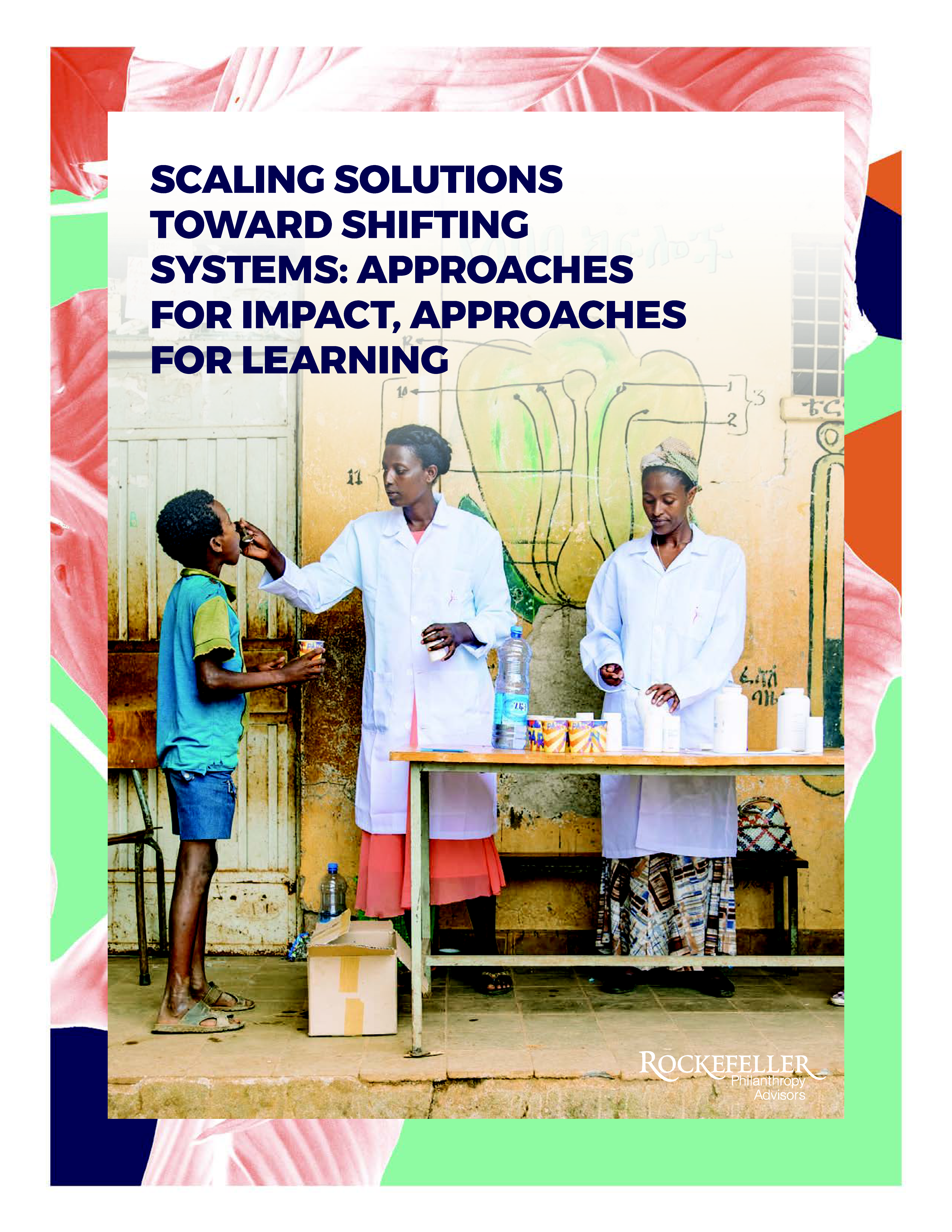Funder collaboration has long been viewed as a useful tool; and now, based on a new report by Rockefeller Philanthropy Advisors, there is specific insight on how, when and why such collaborations can be effective devices for shifting the systems that are the root cause of many of today’s societal challenges.
Rockefeller Philanthropy Advisors (RPA) recently felt the imperative to dig into the discourse on collaboration, albeit from a slightly different angle: focusing on philanthropic funder collaboratives that are making a real difference in supporting grantees to shift systems. The result of RPA’s research into these types of funder collaboratives is a recently published report and accompanying web portal Scaling Solutions Toward Shifting Systems: Approaches for Impact, Approaches for Learning. The research and report are part of a larger Scaling Solutions initiative, launched by RPA with the support of a steering group with representatives from the Skoll Foundation, the Ford Foundation, Porticus, and Draper Richards Kaplan Foundation. Over the past two years, this initiative has delved deeply into how funder behavior helps or hinders organizations around the world to scale solutions to pressing problems.
A year ago, RPA released its first Scaling Solutions report, which highlighted successful, impactful nonprofits and the effect funders’ practices had on their progress. That report made five recommendations to funders interested in systems change, regarding their interactions with grantees, which included:
- Streamline processes for application and reporting.
- Collaborate more effectively.
- Accelerate impact through non-monetary support.
- Learn more about systems change.
- Empower grantees by intentional shifting funder/grantee power dynamics.
As RPA and the steering group took the report and its findings on a global ‘road show,’ while continually testing and further exploring the ideas it raised, funder collaboratives repeatedly emerged as a valuable structure for supporting systems change work. Through collaboratives funders have been able to streamline grant processes and facilitate the distribution of larger resources. Collaboratives have also acted as trusted learning spaces, catalyzing members to operate differently (and better).
This new report, RPA’s second Scaling Solutions publication, summarizes seven key findings on funder collaboratives:
- For funders seeking systems change, collaborations can be more effective and rewarding than going it alone.
- Organic growth of the collaborative based on pre-existing relationships provides certain benefits and a stronger growth trajectory.
- Identifying and supporting strong leadership is an important foundation for collaborating on long-term systems system.
- Collaboratives united by geography or supporting specific population groups are characterized by thoughtful, responsive practices that can serve as models to be adopted more widely.
- Aligning on theory of change and embracing the complexity of systems change translate to a higher likelihood that funders can and will successfully pool funds.
- Funder collaboratives want to delve more into monitoring and evaluation processes for assessing systems level progress and results.
- Systems change collaboratives frequently experience the same set of obstacles, and resolving these creates a stronger basis for success.
Most importantly, the report and website highlight about 30 inspiring examples from which the funder community can learn. Research has revealed that funders are most influenced by their peers. It is both why funder collaboratives can be so powerful and why it is so important to be exposed to compelling examples of new approaches to collaboration and grantee support.
I was most excited about the first case study featured in the report, a case that describes a time in which Muso, an impressive nonprofit aiming for universal healthcare coverage, needed and benefited from the support and partnership of several funders who are members of Big Bang Philanthropy. I had the privilege of interviewing Ari Johnson, Muso’s CEO. Hearing the details of this experience and how funders were true partners in helping Muso raise the funds it needed to take advantage of an extraordinary opportunity as well as supporting Muso to become a stronger, more sustainable organization, was inspiring.
In interviewing participating funders and grantees of the collaboratives highlighted in the report, no one felt they had it all figured out – but they could point to structures they’d created and practices they’d implemented through their collaboratives that were making a difference. And they had confidence that they’d continue to hone their approaches and deepen their impact. We hope you’ll join them and us on a learning journey as we continue to explore how funders can adjust their practices to be most supportive of scaling solutions that shift systems.
Joanne Schneider is Senior Philanthropic Advisor at Rockefeller Philanthropy Advisors







Comments (0)